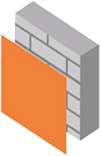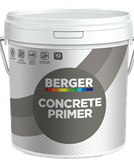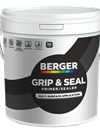Features
See allSurface preparation:
- Surface must be clean, free contaminants, mould and mildew
- Scrape off loose paint and sand to a smooth surface
- New plaster must be cured at least 30 days before priming
- For adhesion on glossy surfaces, scuff sand surface thoroughly before priming
- Treat fungus and algae with Berger Sterilizing Solution
Application Procedure:
- Ready-to-use formulation
- Apply by brush, roller or sprayer
- No mixing required
- Stir thoroughly before and occasionally during use
- Dilute no more than 10% water for spray application
- Prime the entire surface to ensure a uniform appearance of the topcoat
- Berger ALD Concrete Primer is tintable
- Tinting recommended in a lighter shade than the topcoat when painting dark colours
- Application in wet humid conditions will slow drying time
Tips: Primers provide an extra wear-layer and facilitate adhesion of the topcoat to its surface, and are ideal especially in cases of extreme exposure.
Tools you will need
Available Packs

1 Coat
11.00 m2/Ltr**
Coverage
On well-prepared surfaces, as per the painting system recommended. Please refer to the Product Data Sheet for surface preparation and method of application.
** Actual coverage may vary from the quoted coverage due to factors such as method and condition of application, surface roughness, and porosity.
Solve Potential Paint Problems
Efflorescence is the formation of crusty white salt deposits, leaching on to the surface of masonry or mortar as water passes through it.
What are the possible causes?
- Efflorescence occurs when water gets into concrete and dissolves lime within the concrete matrix
- As the water evaporates, lime is carried to the surface and deposited as salt
- Excess moisture escaping through the walls
- Insufficient curing time for new cement or mortar
- Painting on incompletely dried or uncured concrete
- Failing to adequately prepare the surface by removing all previous efflorescence
What is the solution?
- Eliminate the source
- Seal cracks with Berger Siliconized Acrylic Caulk
- Remove efflorescence and loose material by wire brush or power washer
- Apply Berger Alkali Sealer
- Apply a premium quality topcoat like Berger Weatherproof Ultra
We recommend you use these painting systems in order of base coat, first coat, and second coat:
The yellow cast that appears over previously painted white surfaces is called yellowing, and mostly occurs with oil paints.
What are the possible causes?
- Use of oil paint in areas not receiving direct sunlight
- Oxidation of alkyd or oil-based paint or varnish as it ages
- Heat from stoves, radiators and heating ducts will turn oil paint yellow
- Lack of light in dark areas such as behind picture frames, appliances and inside closets
- Tobacco staining or other environmental contaminants
What is the solution?
- Because of their drying process water-based painting systems fear better in enclosed areas
- Water-based acrylic paints are non-yellowing
- If your preference is for oil paint, ensure maximum sunlight to minimise yellowing
We recommend you use these painting systems in order of base coat, first coat, and second coat:
we also recommend
-
Get Inspiration
-
Make Your Plan

Let us design a project plan to suit your needs.
-
Colour Tools














-can_3545.png?width=82&height=102&mode=crop)

